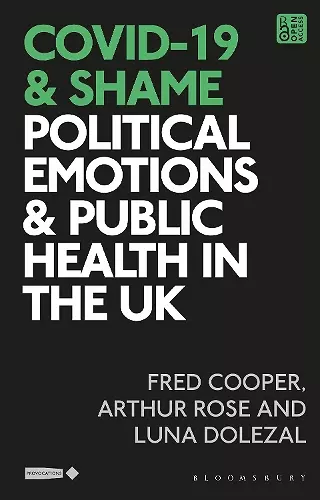COVID-19 and Shame
Political Emotions and Public Health in the UK
Luna Dolezal author Dr Arthur Rose author Fred Cooper author
Format:Paperback
Publisher:Bloomsbury Publishing PLC
Published:9th Feb '23
Currently unavailable, and unfortunately no date known when it will be back

Examining how shame and stigma became part of the UK's public health response to COVID-19, this book argues for “shame sensitive” interventions.
This open access book examines the various ways that shame, shaming and stigma became an integral part of the United Kingdom’s public health response to COVID-19 during 2020.
As the Covid-19 pandemic unfolded in 2020, it quickly became clear that experiences of shame, shaming and stigma dominated personal and public life. From healthcare workers insulted in the streets to anti-Asian racism, the online shaming of “Covidiots” to the identification of the “lepers of Leicester”, public animus about the pandemic found scapegoats for its frustrations. Interventions by the UK government maximised rather than minimized these phenomena. Instead of developing robust strategies to address shame, the government’s healthcare policies and rhetoric seemed to exacerbate experiences of shame, shaming and stigma, relying on a language and logic that intensified oppositional, antagonistic thinking, while dissimulating about its own responsibilities.
Through a series of six case studies taken from the events of 2020, this thought-provoking book identifies a systemic failure to manage shame-producing circumstances in the UK. Ultimately, it addresses the experience of shame as a crucial, if often overlooked, consequence of pandemic politics, and advocates for a "shame sensitive" approach to public health responses.
The open access edition of this book is available under a CC BY 4.0 licence on www.bloomsburycollections.com Open access was funded by The Wellcome Trust.
This book on COVID-19 and the role shame and shaming has played in the handling of the pandemic in the UK and elsewhere is much to be welcomed. It offers both a sophisticated understanding of a multidimensional concept and a wide-ranging analysis of its personal, social and political salience for pandemic governance and for how people struggled to make sense of their changed lives. The authors are to be congratulated for their accessible reporting of a ground-breaking piece of research. * Graham Scambler, Emeritus Professor of Sociology at UCL, UK *
Six detailed, very telling case-studies implicate each one of us in adding to the anguish of the pandemic. In the context of thousands of unnecessary deaths, we blame and shame others for sins of omission and commission of which we are probably equally guilty. But the lasting realization of this pioneering study of shame as a social emotion is that we have been deliberately manipulated by a shameless government intent on diverting attention from its own culpability. * Robert Walker, Professor Emeritus and Emeritus Fellow of Green Templeton College, University of Oxford, UK *
COVID-19 and Shame ... offers an important and provocative examination of the role of shame in the UK’s pandemic response during 2020. Across these distinct chapters, Cooper, Dolezal, and Rose highlight the multifaceted manifestations of shame and shaming within the context of Covid-19, and the book is well-structured to point to a central contention around the utilisation of shame at the expense of vulnerable and marginalised communities. Through well-chosen case studies and thoughtful analysis, each chapter furthers this argument poignantly and accessibly, advocating for ‘public health work which takes shame seriously and sets out to avoid and reduce it’ (p. 18). The book will be a welcome intervention in medical and health humanities, and will be of interest to scholars and general readers considering Covid-19, pandemic politics, and ‘shame sensitive’ approaches to public health. * British Society of Literature and Science *
Through both a “shame lens” and “shame sensitive practice,” readers in the medical humanities will gain tools and theory to interrogate the relationship between emotions and medical practice, looking to the heart of healthcare in society. * Journal of Medical Humanities *
ISBN: 9781350283404
Dimensions: unknown
Weight: unknown
160 pages